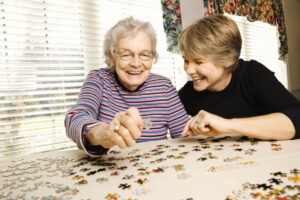New approaches to memory care are part of the movement to reduce fear and misconceptions about dementia.
In the media, people with dementia are typically portrayed as frail and disengaged. They’re usually shown in a nursing home slumped over in a wheelchair or looking off into empty space. These images contribute to the “public narrative of despair” about dementia, according to Dr. John Zeisel. “They present Alzheimer’s as the end of your brain, the end of your life, the end of your relationships,” he says. These stereotypes perpetuate a stigma that hinders perception, awareness and treatment of dementia.
Zeisel is the president and founder of Hearthstone Alzheimer’s Care and the I’m Still Here ™ Foundation. Both organizations advocate for a more hopeful approach to addressing and treating those living with dementia. Zeisel says people with the disease are still able to live a full life, especially during the first 10 years or more after diagnosis.
The first step to changing the narrative is discrediting three societal misconceptions about dementia.
1. Dementia robs people of their ability to learn new things.
People with Alzheimer’s can still acquire new skills, says Zeisel, they just do so in a different way. Dementia damages the area of the brain that is used to recall facts and events. This makes it difficult for people with dementia to memorize new information or learn things in a typical classroom setting. But the learning system that encodes motor skills, called the procedural system, remains intact. “That system stays alive and stays vibrant,” says Zeisel. “So if you have dementia, you still can learn as long as you’re not asked to learn like we did in school.” This means that people with dementia can still learn how to perform new tasks and skills. For example, caregivers should try physical, tactile activities such as cooking or painting. Try performing a simple recipe multiple times. The person with dementia should begin to learn how to perform the steps after enough procedural repetition, even if they can’t remember the list of ingredients.
2. People with dementia can’t maintain relationships with others.
It’s true that maintaining a relationship requires a shift in thinking, but it’s definitely possible if you focus on building a new relationship on top of the old one. One step to doing this is finding new ways to communicate. Dementia can make it difficult to hold a conversation, but there are ways to interact besides language. Physical contact, body language and facial expressions can all be used in place of words to express something to someone with dementia. “It’s using all the ways we have to communicate that we use every day but spending less time using complex words and sentences,” says Zeisel. Another step to maintaining relationships is respecting the transition and changes in that person and adapting to the new roles you both play. “The first thing you have to do is give up defining the person like they used to be, and let them emerge as the person they are,” Zeisel says. He advises caregivers not to question why the person with dementia no longer likes certain things or activities. Zeisel compares this to a person growing up—you wouldn’t assume that a teenager would like the same things he did as an infant, nor that an adult with a lot of experience has the same preferences as when he was younger. Respecting and accepting the new preferences of the person with dementia will enable you to maintain a strong, loving relationship.
3. People with dementia can’t be treated—or can only be treated using prescription medication.
Though there is no known cure, there are a variety of effective options for managing dementia. Medication can help minimize symptoms for some, but Zeisel says this is just one of numerous options. “There are many different ways you can use non-pharmacological approaches to reduce people’s symptoms,” he says. These treatments focus on alleviating the four main symptoms of dementia: anxiety, agitation, aggression and apathy. Many memory care communities have found success with activities that foster engagement, like specially designed reading groups or social clubs. Zeisel says art and creative activities have been especially effective in reducing symptoms at Hearthstone. One participant in an art program was a former artist with dementia who hadn’t painted for years. He began to paint in the class, and his artwork became more complex as time went on. After a year, he was teaching other students and eventually running his own painting class.
Dementia is a difficult disease, but it does not have to be the end of a person’s life. Programs like I’m Still Here are creating a new narrative about dementia, one that is centered on hope. By focusing on the strengths and skills that remain, this approach is helping those with dementia lead rich, fulfilling lives.
Learn more about how Elder Care Alliance memory care communities implement the I’m Still Here philosophy.




















